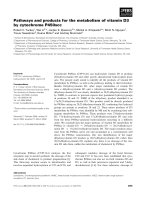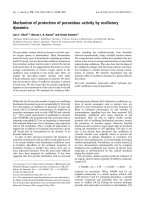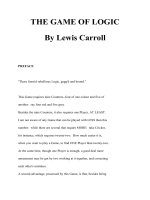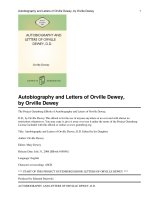The Tyranny Of The Dark By Hamlin Garland doc
Bạn đang xem bản rút gọn của tài liệu. Xem và tải ngay bản đầy đủ của tài liệu tại đây (4.17 MB, 293 trang )
The Tyranny
of the Dark
Hamlin Garland
“SHE CAME SLOWLY, WITH ONE SLIM HAND ON THE
RAILING“
THE TYRANNY
OF THE DARK
BY
HAMLIN GARLAND
AUTHOR OF
“THE CAPTAIN OF THE GRAY-HORSE TROOP“
“HESPER“ “THE LIGHT OF THE STAR“
ETC. ETC.
LONDON AND NEW YORK
HARPER & BROTHERS
PUBLISHERS :: MCMV
CONTENTS
I. T
HE SETTING
II. T
HE MAID ON THE MOUNTAIN-SIDE
III. T
HE MAN
IV. A
SECOND MEETING
V. P
UPIL AND MASTER
VI. I
N THE MARSHALL BASIN
VII. T
HE FORCES OF LIGHT AND DARKNESS
VIII. D
R. BRITT EXPLAINS
IX. A
NTHONY CLARKE, EVANGEL
X. C
LARKE‘S WOOING
I. T
HE MODERNISTS
II. N
EWS OF VIOLA
III. B
RITT COMES TO DINE
IV. T
HE PATRON OF PSYCHICS
V. K
ATE VISITS VIOLA
VI. S
ERVISS LISTENS SHREWDLY
VII. T
HE SLEEPING SIBYL
VIII. K
ATE‘S INTERROGATION
IX. V
IOLA‘S PLEA FOR HELP
X. M
ORTON SENDS A TELEGRAM
XI. D
R. BRITT PAYS HIS DINNER-CALL
XII. V
IOLA IN DINNER-DRESS
XIII. T
HE TEST SÉANCE
XIV. P
UZZLED PHILOSOPHERS
XV. V
IOLA REVOLTS FROM CLARKE
XVI. T
HE HOUSE OF DISCORD
XVII. W
HEN DOCTORS DISAGREE
XVIII. L
AMBERT INTERVENES
XIX. S
ERVISS ASSUMES CONTROL
XX. T
HE MOTHER‘S FAITH
XXI. C
LARKE SHADOWS THE FEAST
XXII. T
HE SPIRITUAL RESCUE
ILLUSTRATIONS
“SHE CAME SLOWLY, WITH ONE SLIM HAND ON THE
RAILING“
“THERE WAS IN HIS LOOK AN EXPRESSION OF
ACKNOWLEDGED KINSHIP“
“SERVISS LISTENED WITH GROWING AMAZEMENT“
“VIOLA, TOO, CAME BACK TO BEWITCH HIM FROM HIS
READING“
“‘WHAT DO YOU MEAN? DO YOU WANT TO KILL THE
PSYCHIC?‘“
“‘BUT, TELL ME, HOW DID THE CHANGE COME? WHAT
BEGAN TO HAPPEN?‘“
“THE GIRL‘S EYES WERE OPENING AS FROM NATURAL
SLUMBER“
“‘YOU NEED NOT SPEAK—JUST PUT YOUR HAND IN MINE
AND I WILL UNDERSTAND‘“
THE CHARACTERS CONCERNED
Those in the
Light
V
IOLA LAMBERT, the
subject
M
RS. LAMBERT, her
mother
J
OS. LAMBERT, her step-
father
A
NTHONY CLARKE, her
pastor
D
R. BRITT, her physician
M
ORTON SERVISS, her
lover
K
ATE RICE, her friend
D
R. WEISSMANN, her
investigator
S
IMEON PRATT, her
patron
Those in the
Dark
W
ALDRON, her father
M
CLEOD, her “control“
W
ALTIE, her poltergeist
J
ENNIE PRATT, Pratt‘s
eldest daughter
M
RS. PRATT, “Loggy,“
and others dimly felt
The Tyranny of the Dark
1
BOOK I
I
THE SETTING
The village of Colorow is enclosed by a colossal amphitheatre of
dove-gray stone, in whose niches wind-warped pines stand like
spectators silent and waiting. Six thousand feet above the valley
floor green and orange slopes run to the edges of perennial ice-fields,
while farther away, and peering above these almost inaccessible
defences, like tents of besieging Titans, rise three great mountains
gleaming with snow and thunderous with storms. Altogether a stage
worthy of some colossal drama rather than the calm slumber of a
forgotten hamlet.
The railway enters the valley from the south by sinuously following
the windings of a rushing, foam-white stream, and for many miles
the engines cautiously feel their way among stupendous walls,
passing haltingly over bridges hung perilously between
perpendicular cliffs by slender iron rods, or creep like mountain-cats
from ledge to ledge, so that when they have reached safe harbor
beside the little red depot they never fail to pant and wheeze like a
tired, gratified dog beside his master‘s door. Aside from the coming
and going of these trains, the town is silent as the regarding pines.
The only other ways of entrance to this deep pocket lie over
threadlike trails which climb the divide from Silver City and Toltec
and Vermilion, and loop their terrifying courses down the declivities
trod only by the sturdy burro or the agile, sure-footed mountain-
horse. These wavering paths, worn deep and dusty once, are grass-
grown now, for they were built in the days when silver was
accounted a precious metal, and only an occasional hunter or
prospector makes present use of them.
Colorow itself, once a flaming, tumultuous centre of miners,
gamblers, and social outcasts, is now risen (or declined) to the quiet
of a New England summer resort, supported partly by two or three
big mines (whose white ore is streaked with gold), but more and
more by the growing fame of its mountains and their medicinal
springs, for these splendid peaks have their waters, hot and cold and
sweet and bitter, whose healing powers are becoming known to an
The Tyranny of the Dark
2
ever-growing number of those Americans who are minded to
explore their native land.
This centre of aërial storms, these groups of transcendent summits,
would be more widely known still, but for the singular sense of
proprietorship with which each discoverer regards them. The lucky
traveller who falls into this paradise is seized with a certain instant
jealousy of it, and communicates his knowledge only to his family
and his friends. Nevertheless, its fame spreads slowly, and each year
new discoverers flock in growing numbers to the one little hotel and
its ramshackle bath-house, so that the community once absolutely
and viciously utilitarian begins to take timid account of its aesthetic
surroundings, and here and there a little log-cabin (as appropriate to
this land as the chalet to the Alps) is built beside the calling ripples
of the river, while saddled horses, laden burros in long lines, and
now and then a vast yellow or red ore-wagon creaking dolefully as it
descends, still give evidence of the mining which goes on far up the
zigzag trails towards the soaring, shining peaks of the Continental
Divide.
The Tyranny of the Dark
3
II
THE MAID ON THE MOUNTAIN-SIDE
One day in July a fair young girl, with beautiful gray eyes, sat
musingly beside one of these southern trails gazing upon the
inverted pyramid of red sky which glowed between the sloping
shoulders of the westward warding peaks. Her exquisite lips, scarlet
as strawberry stains, were drawn into an expression of bitter
constraint, and her brows were unnaturally knit. Her hat lay beside
her on the ground, her brown hair was blowing free, and in her eyes
was the look of one longing for the world beyond the hills. She
appeared both lonely and desolate.
It was a pity to see one so young and so comely confronting with sad
and sullen brow such aërial majesty as the evening presented. It was,
indeed, a sort of impiety, and the girl seemed at last to feel this. Her
frowning brow smoothed out, her lips grew more girlish of line, and
at length, rapt with wonder, she fixed her eyes on a single purple
cloud which was dissolving, becoming each moment smaller, more
remote, like a fleeing eagle, yet burning each instant with even more
dazzling flame of color than before—hasting as if to overtake the
failing day. A dream of still fairer lands, of conquest, and of love,
swept over her—became mirrored in her face. She had at this
moment the wistful gaze which comes to the eyes of the young when
desire of the future is strong.
Upon her musings a small sound broke, so faint, so far, she could not
tell from whence it came nor what its cause might be. It might have
been the rattle of a pebble under the feet of a near-by squirrel or the
scrambling rush of a distant bear. A few moments later the voice of a
man—very diminished and yet unmistakable—came pulsing down
the mountain-side.
The girl rose as lightly, as gracefully as a fawn who, roused but not
affrighted, stands on her imprint in the grass and waits and listens.
The man or men—for another voice could now be heard in answer—
came rapidly on, and soon a couple of men and a small pack-train
came out of a clump of thick trees at the head of a gulch, and,
doubling backward and forward, descended swiftly upon the girl,
who stood, with some natural curiosity, to let the travellers, whoever
they might be, pass and precede her down to the valley. She resented
The Tyranny of the Dark
4
them, for the reason that they cut short her reverie, her moment of
spiritual peace.
The man who first appeared was a familiar type of the West, a small,
lean, sharp-featured, foxy-eyed mountaineer, riding gracefully yet
wearily—the natural horseman and trailer. Behind him two tired
horses, heaped with a camp outfit, stumbled, with low-hanging
heads, while at the rear, sitting his saddle sturdily rather than with
grace, rode a young man bareheaded, but otherwise in the rough-
and-ready dress of a plainsman. His eyes were on the sunset also,
and something in the manner of his beard, as well as in the poise of
his head, proclaimed him to be the master of the little train, a man of
culture and an alien.
At sight of the girl he smiled and bowed with a look of frank and
most respectful admiration, quite removed from the impudent stare
of his guide. His hands were gloved, he wore a neat shirt, and his tie
was in order—so much the girl saw as he faced her—and as he
passed she apprehended something strong and manly in the lines of
his back and shoulders. Plainly he was not to the saddle born, like
the man ahead, and yet he was quite as bronzed and travel-worn.
A turn in the trail brought them both close under her feet, and again
the man in the rear glanced up at the figure poised on the bowlder
above him, and his eyes glowed once more with pleasure. There was
in his look an expression of acknowledged kinship, as of one refined
soul to another, a kind of subtle flattery which pleased while it
puzzled the girl. Men with eyes of that appeal were not common in
her world.
The bitter look vanished out of her face. She gazed after the trailer
with the unabashed interest of a child, wondering who he might be.
In that instant her soul, impressionable and eager, received and
retained, like a sensitive plate, every line of his figure, every minute
modelling of his face—even his fashion of saddle and the leather of
his gun-case remained with her as food for reflection, and as she
loitered down the trail a wish to know more about him rose in her
heart. There was a kind of smiling ecstasy on his face before he saw
her—as if he, too, were transported by the scene, and this expression
came at last to be the chief revelation of his character.
The Tyranny of the Dark
5
“THERE WAS IN HIS LOOK AN EXPRESSION OF
ACKNOWLEDGED KINSHIP“
The Tyranny of the Dark
6
The red went out of the sky. The golden eagle of cloud flew home
over the illimitable seas of saffron, the purple shadows rose in the
valleys, the lights of the town began to sparkle. Engine-bells clanged
to and fro, and the strains of a saloon band rose to vex the girl‘s
poetic soul with repugnant remembrances of the dance-hall. “I
suppose he is only camping through,“ she thought, a little wistfully,
referring back to the stranger. “I wish I knew who he is.“
As she came down to the level of the stream its friendly roar cut off
the ribald music and the clamor of the engines precisely as the bank
shut away the visible town, leaving the little row of pretty cottages in
the ward of the mountains and the martial, ranked, and towering
firs.
At the foot of the trail a gray-haired woman met her. It was her
mother, disturbed, indignant. “Viola Lambert, what do you mean by
staying up there after dark? I‘m all a-tremble over you.“
“It isn‘t dark, mother,“ answered the girl; “and if it were, it isn‘t the
first time I‘ve been out alone.“
Mrs. Lambert‘s voice softened. “Child, I can hardly see your face!
You must not do such things. I don‘t mind your being out on
horseback, but you must not go up there afoot. It is dangerous with
all these tramp miners coming and going.“
“Well, don‘t scold—I‘m here safe and sound.“
“I haven‘t had such a turn for years, Viola,“ the mother explained, as
they waited side by side along the narrow walk. “I had an
impression—so vivid—that I dropped my work and ran to find you. It
was just as if you called me, asking for help. It seemed to me that
some dreadful thing had happened to you.“
“But nothing did. I went up to see the sunset. I didn‘t meet a soul.“
She ended abruptly, for she did not wish to retrace her sad reverie.
“Who were the two men who came down just now? They must have
passed you.“
“Yes, they passed me—I didn‘t know them. The one behind looked
like an ‘expert.‘ Perhaps he has come to examine the San Luis mine.
Some one said they were expecting a man from England.“
“He looked more like a Frenchman to me.“
“It may be he is,“ answered Viola, restrainedly.
The Tyranny of the Dark
7
They turned in at a rustic gateway opening into the yard of a small
and very pretty log-cabin which seemed a toy house, so minute was
it in contrast to the mighty, fir-decked wall of gray and yellow rock
behind it. Flowers had been planted along the path, and through the
open door a red-shaded lamp shone like a poppy. Plainly it was the
home of refined and tasteful women, a place where tall, rude men
entered timidly and with apologies.
“Was there any mail?“ asked the girl, as she put aside her hat.
“Not a thing.“
The shadow deepened on her small, sensitive face. “Oh, why don‘t
the girls write? they should know how horribly lonely it is here. I‘m
tired of everything to-day, mother—perfectly stone-blue. I don‘t like
what I am; I‘m tired of church-work and the people here. I want to
go back East; I want to change my life completely.“
The mother, a handsome woman, with fresh, unlined face, made no
reply to this outburst. “Gusta won‘t be back until late; we will have
to get our own supper.“
The girl seemed rather pleased at this opportunity to do something,
and went to her work cheerfully, moving with such grace and
lightness that the mother stood in doting admiration to watch her;
she was so tall and lithe and full-bosomed—her one treasure.
As she worked, the shadow again lifted from the girl‘s face, a smile
came back to her scarlet lips, and she sang underbreath as only a
young maiden can sing to whom love is a wonder and marriage a
far-off dream.
She recalled the look which lay on the face of the man who was
riding with bared head in ecstasy of the scene above and below him;
but, most of all, she dwelt upon the gracious and candid glance of
admiration with which he greeted her and which he repeated as he
disappeared below her to be seen no more.
This look went with her to her room, and as she sat at her window,
which opened upon the river, she wondered whether he had gone
into camp in the pine groves just below the bridge, or whether he
had taken lodgings at the hotel.
She had lovers—no girl of her charm could move without meeting
the admiring glances of men; but this stranger‘s regard was so much
more subtly exalting—it held an impersonal quality—it went beyond
her entire understanding, adding an element of mystery to herself, to
him, and to the sunset.
The Tyranny of the Dark
8
III
THE MAN
Meanwhile the young tourist had alighted before the door of the
principal hotel, and, after writing his name in a clear and precise
hand on the book in the office, had hastened to his supper, carrying a
most vivid recollection of the slender figure and flushed and
speaking face of the girl on the trail. That moment of meeting,
accidental and fleeting, had already become a most beautiful climax
of his pilgrimage. “She was born of the sunset; she does not really
exist,“ he said, with unwonted warmth of phrase. “How could this
little mining town produce so exquisite a flower?“
His grosser needs supplied, he lit his big student‘s pipe and went out
upon the upper story of the hotel‘s rude porch, and there sat,
listening to the rush of the stream, while the great yellow stars
appeared one by one above the lofty peaks, and the air grew crisp to
frostiness. He was profoundly at peace with the world and himself,
his physical weariness being just sufficient to give this hour a sound
completeness of content.
As the beauty of the night deepened, the girl‘s beauty allured like the
moon. He still sought to explain her. “She is some traveller like
myself,“ he said, “Bret Harte to the contrary, notwithstanding, the
wilderness does not produce maids of her evident refinement and
grace. She comes of a long line of well-bred people.“
He was not an emotional person, and had not been permitted to
consider pleasure the chief object, even of a vacation, but he went to
his bed that night well pleased with Colorow, and with a half-
defined sense that this was, after all, the point towards which his
long journey, with all its windings, had really tended. However, he
was not ready to acknowledge that a large part of the charm of the
place was due to the glamour of a slender maid lit by the sunset
light.
This delight in the town and its surroundings gained a new quality
next morning as he looked from his window upon a single white
cloud resting like a weary swan on the keen point of old Kanab.
Though the mesas of New Mexico and the deserts of Arizona were
his special field, he bared his head to the charm of “the high
country.“
The Tyranny of the Dark
9
Each summer, after months of prolonged peering into the hidden
heart of microscopic things in his laboratory (he was both analytical
chemist and biologist), it was his custom to return for a few weeks to
huge, crude synthetic, nature for relief. After endless discussion of
“whorls of force“ and of “the office of germs in the human
organism,“ he enjoyed the racy vernacular of the plainsman, to
whom bacteria were as indifferent as blackberry-seeds. Each year he
resolved to go to the forest, to the lake regions, or to the mountains;
but as the day of departure drew near the desert and the strange
peoples living thereon reasserted their dominion, and so he had
continued to return to the sand, to the home of the horned toad and
the rattlesnake. These trips restored the sane balance of his mind. To
camp in the chaparral, to explore the source of streams, and to relive
the wonder of the boy kept his faculties alert and keen.
His love of the sands and the purple buttes of the plain did not blind
him to the beauty of coloring and the gracious majesty of these
peaks, clothed as they were with the russet and gold and amber of
ripened grasses, which grew even to the very summits (only the
kingliest of the peaks were permitted to wear the ermine robes
which denoted sovereignty); the Continental Divide was, indeed,
much more impressive than he had expected it to be.
He was not one of those who seek out strange women, and he had
no hope of meeting the girl of the mountain-side again. He was
content to have her remain a poem—a song of the sunset—a picture
seen only for a moment, yet whose impression outlasts iron.
Everything in nature had converged to make her momentous. His
long stay among the ugly, dusky women of the desert, his exultant
joy in the mountain sunset, and his abounding health (which filled
his heart with the buoyancy of a boy)—all these causes combined to
revive emotions which his absorption in scientific investigation had
set in the background—emotions which concern the common man,
but which the deeply ambitious chemist, eager to discover the
chemical molecular structure of the plasm, must put aside with a
firm hand.
The Tyranny of the Dark
10
IV
A SECOND MEETING
Viola was just leaving her mother‘s gate the following afternoon
when a man‘s voice, cordial, assured, and cultivated, startled her.
“Good-morning. Is this your home?“
She looked up to meet the smiling eyes of the stranger horseman.
Again an indefinable charm of manner robbed his greeting of
offence, and quite composedly she replied:
“Yes, this is our home.“
“What a view you have, and what music!“ He indicated the river
which ran white and broad over its pebbles, just below the walk. “I
am enchanted with the place. I think you must love it very much.“
Her face expressed a qualified assent. “Oh yes, but I get tired of it
sometimes, especially in winter when we are all shut in with snow.“
“Then you really are a year-round resident? I suppose my view is the
tourist‘s view. I can‘t believe anybody lives here in winter. I hope
you won‘t mind my introducing myself“—he handed her a card.
“You made such a pretty picture up there beside the trail yesterday
that I couldn‘t forbear speaking to you on a second meeting. I
wanted to know whether you were real or just a fragment of sunset
cloud.“
The ease and candor of his manner, joined to the effect of the name
on the card, fully reassured her, and she looked up with a smile.
“Won‘t you come in and rest?“
“Thank you, I should like particularly to do so, I‘ve been for a climb
up that peak behind your cottage and I‘m tired.“
Her reserve quite melted, the girl led the way to the door where her
mother stood in artless wonder.
“Mother, this is Dr. Serviss, of Corlear College.“
“I‘m glad to know you, sir,“ said Mrs. Lambert, with old-fashioned
formality. “Won‘t you come in?“
“Thank you. It will be a pleasure.“
“Are you a physician?“ she asked, as she took his hat and stick.
The Tyranny of the Dark
11
“Oh, dear, no! Nothing so useful as that. I‘m a doctor by brevet, as
they say in the army.“ Then, as though acknowledging that his
hostess was entitled to know a little more about her intrusive guest,
he added: “I am a student of biology, Mrs. Lambert, and assistant to
Dr. Weissmann, the head of the bacteriological department of
Corlear Medical College. We study germs—microscopic ‘bugs,‘“ he
ended, with humorous glance at Viola. “What a charming bungalow
you have here! Did you gather those wild flowers?“
Viola answered in the tone of a pupil to her master, “Yes, sir.“
“But some of them grow high. You must be a mountaineer. Pardon
my curiosity—it is inexcusable—but how long have you lived here?“
The mother looked at her daughter for confirmation. “Eight years.“
“Of course you are from the East?“
“Yes, from Wisconsin.“
He laughed. “We call Wisconsin a Western State. Of course, it‘s the
ignorant prejudice of the New-Yorker, but I find it hard to think of
you as actual residents of this far-away little town. I thought only
miners lived here?“
“We are miners. My husband has a mine up in the Basin, but he‘s
putting in some new machinery just now and is unable to come
down but once a week.“ Then mildly resenting his implied criticism
of the town, she added: “We have just as nice people here as you‘ll
find anywhere.“
He responded gallantly, “I am quite prepared to believe that, Mrs.
Lambert. But do many nice people like you live here all the year
round?“ He was bent on drawing the girl out, but she did not
respond.
The mother answered: “I haven‘t been away except to take my
daughter East to school.“
He was cautious. “By East you mean Milwaukee?“
“Diamond Lake, Wisconsin.“
He turned to the girl. “How long were you away?“
“Four years.“
“Did you like it?“
“Very much.“
The Tyranny of the Dark
12
“That is the reason you find it lonesome here.“ Up to this moment
his attitude was that of a teacher towards a pretty pupil. “You miss
your classmates, I suppose? Still there must be diversions here, even
for a young girl.“
The mother sighed. “It really is very lonesome here for Viola—if it
weren‘t for her church work and her music I don‘t know what she‘d
do. There are so few young people, and then her years at the
seminary spoiled her for the society out here, anyway.“
“So much the worse for Colorow society,“ laughed Serviss. Then, to
clear the shadow which had gathered on the girl‘s face, he said: “I
see a fine piano, and shelves of music books. This argues that you
love music. Won‘t you sing for me? I am hungry for a song.“
“I do not sing,“ she replied, coldly, “I have no voice.“
“Then play for me. I have been for eight weeks on the desert and I
am famishing for music.“
“Are you a musician?“ asked Mrs. Lambert.
“Oh no, only a music-lover.“
“My daughter is passionately fond of the piano,“ the mother
explained, “and her teachers advised her to go on and make a
specialty of it. They recommended Boston, but Viola wants to go to
New York. She wanted to go last year, but I couldn‘t let her go. I‘d
been without her for four years, and Mr. Lambert‘s affairs wouldn‘t
permit us both to go, and so she had to stay; but it does seem too bad
for one as gifted as she is to give it up.“
At this moment Serviss changed his entire attitude towards these
people. They were too genuine, too trustful, and too fine to permit of
any patronization, and the girl‘s dignified silence and the charm of
her pellucid eyes and rose-leaf lips quite transmuted him from the
curious onlooker to the friend. “I can understand your dilemma,“ he
said, with less of formal cheer and more of genuine sympathy. “And
yet, if your daughter has most decided talent it is only fair to give
her a chance to show what she can do.“
The girl flushed and her eyes fell as the mother bent towards her
visitor.
“I wish you would listen to her play, Dr. Serviss, and tell me what
you think of her talent.“
His eyes shone with humor. “I will listen with great pleasure; but
don‘t ask a chemist to judge a pianist. I love music—it is a sweet
The Tyranny of the Dark
13
noise in my ears—but I can hardly distinguish Chopin from
Schumann.“ He faced the girl. “Play for me. I shall be very deeply
indebted.“ As she still hesitated he added: “Please do, or I will
certainly think you consider me intrusive.“
As Viola slowly rose, Mrs. Lambert said: “You must not feel that
way, Dr. Serviss. We are highly honored to entertain one so eminent
as you are. I was brought up to value learning. Play for him, Viola.“
“What is the reason for her reluctance?“ Serviss asked himself. “Is it
shyness? Or does she resent me?“
With a glance of protest at her mother the girl took her seat at the
piano. “I will try,“ she said, bluntly. “But I know I shall fail.“
Twice she laid her hands upon the keys only to snatch them away
again as if they were white-hot metal, and Serviss fancied her cheek
grew pale. The third time she clashed out a few jarring chords
intermixed with quite astonishing roulade on the treble—an
unaccountable interruption, as if a third hand had been thrust in to
confuse her. She stopped, and he began to share her embarrassment.
She tried again, shaking her head determinedly from side to side as
if to escape some invisible annoying object. It seemed as if some
mocking sprite in the instrument were laboring to make her every
harmony a discord, and Serviss keenly regretted his insistence.
Suddenly she sprang up with an impatient, choking cry. “I can‘t do
it! He won‘t let me!“ she passionately exclaimed, and rushed from
the room leaving her visitor gazing with pity and amazement into
the face of the mother, who seemed troubled but in no wise
astounded by her daughter‘s hysterical action. She sat in silence—a
painful silence, as if lacking words to express her thought; and
Serviss rose, rebuked, and for the first time ill at ease.
“I beg your pardon, Mrs. Lambert; I didn‘t intend to embarrass your
daughter.“
“She is very nervous—“
“I understand. Being a complete stranger, I should not have insisted.
One of the best singers I ever knew was so morbidly shy that on the
platform she was an absolute failure. Her vocal chords became so
contracted that she sang quite out of tune, and yet among friends she
was magnificent.“
The mother‘s voice was quite calm. “It was not your fault, sir.
Sometimes she‘s this way, even when her best friends ask her to
The Tyranny of the Dark
14
play. That‘s why I fear she will never be able to perform in
concerts—she is liable to these break-downs.“
He was puzzled by something concealed in the mother‘s tone, and
pained and deeply anxious to restore the peaceful charm of the home
into which he had, in a sense, unbiddenly penetrated. “I am guilty—
unpardonably guilty. I beg you to tell her that my request was
something more than polite seeming—I was sincerely eager to hear
her play. Perhaps at another time, when she has come to know me
better, she will feel like trying again. I don‘t like to think that our
acquaintance has ended thus—in discord. May I not come in again,
now that I am, in a sense, explained?“
He blundered on from sentence to sentence, seeking to soften the
stern, straight line on the mother‘s lips—a line of singular repression,
sweet but firm.
“I wish you would come again. I should really like your advice about
Viola‘s future. Can‘t you come in this evening?“
“I shall be very glad to do so. At what hour?“
“At eight. Perhaps she will be able to play for you then.“
With a feeling of having blundered into a most unpleasant
predicament, through a passing interest in a pretty girl, Serviss
retreated to his hotel across the river.
The Tyranny of the Dark
15
V
PUPIL AND MASTER
Once out of the spell of the immediate presence of this troubled
mother and her appealing daughter, Serviss began to doubt and to
question. “They are almost too simple, too confiding. Why should
Mrs. Lambert, at a first meeting, accidental and without explanation,
ask me to take thought of her daughter‘s future?“ The fact that his
connection with an institution of learning gave him a sort of sanctity
in their eyes did not weigh with him. He was of those who take
professorships in the modern way—with levity, either real or
assumed.
“I think, on the whole, I‘d better keep out of this family
complication, whatever it may be,“ he concluded. “This absence of
the husband in the hills may be more significant than at present
appears—it may be a voluntary sequestration. I take the hint. I am
not seeking new responsibilities, and I don‘t care to act as adviser,
even to a pretty girl—especially not to a pretty girl.“ And he waved
his hand in the manner of one declining a doubtful cigar.
But this slim young witch, with the scarlet lips and pleading gray
eyes, was not so easily banished. His inward eye dwelt upon her
with increasing joy, “How beautiful she was, as she stood there on
that bowlder! Perhaps she was posing? She is now at the very height
of her girlish charm. What an appeal she must make to the men of
this region—those exquisite lips—that pliant waist—that full bosom!
There is some antagonism between mother and daughter—
something more than appears on the surface. She is both sullen and
hysterical. What a pity!“
She continued to trouble him as he sat again after his evening meal
on the veranda of the hotel. He could hear the slow tramp of heavy
boots along the sidewalks beneath him, and the roar of the Colorow,
softened by distance, rose and fell like a drowsy tune. On the highest
peaks the after-glow still lingered, and from one of the little cottages
deep in the shadow across the stream a light appeared like a signal,
an invitation, and, the blood in him being young, accepted the lure.
He rose with the impulse. “I‘m going! Why not? ‘Tis a night for
adventure. There‘s no need of involving myself in any wise with
their future. I‘m an outsider, and will take precious good care to stay
so.“ His face was impassive, but his heart was quick within him as









